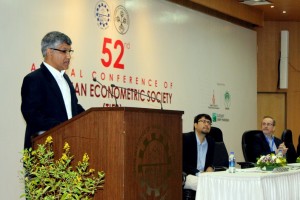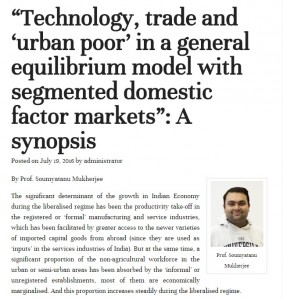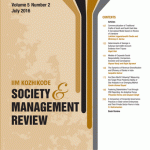DO INDIAN B-SCHOOLS MAKE THEIR GRADUATES SUSTAINABILITY-SENSITIVE?
By Prof. Keyoor Purani
As the large corporations, the world over, jostle to find a place in various sustainability rankings having realized that the stakeholders are getting more and more inclined to ‘clean & green’ capitalism, sustainability is on the top agenda for most companies. Business performance measured by triple bottom-line demand complete paradigm shift in how an organization functions asking for a new mind-set and newer models of doing business.
Are business schools in India preparing their young MBAs for these changes in the business world? Are Indian b-schools aligning their curricula to the changing demands of the employers who hire their graduates? If we have to evaluate leading Indian business schools on their ‘compliance’ to provide sustainability-sensitive graduates, what kind of picture is likely to emerge? Our recent research (with Daragh O’reilly and Sunil Sahadev) attempt to explore these questions as we prepare a roadmap for business schools to bring sustainability in their curricula as part of a project funded by the British Council.
We scanned 50 leading (based on rankings published a national magazine) business schools’ websites for key words often tied to sustainability domain such as Environment, Green, Ethics, Social, Values, Responsibility and Sustainability in the titles of the courses offered by them in their main 2 year MBA program. After checking some face validity (eg. a course titled business environment may not be sustainability focused) of the course titles, we did cluster analysis based on three dimensions of the curricula viz., Weightage: number of courses in sustainability domain, Variety: different titles (eg. Ethics-1 and Ethics-2 may not be considered offering variety) of courses and Commitment: being core or elective courses in the curriculum.
Here is an interesting, though rough, picture of how do Indian b-schools (49. We couldn’t access curriculum of one b-school) stack up with regard to their curricula being sustainability-sensitive.
|
Sustainability Sensitive Curriculum Cluster
|
Business Schools[1]
|
# of B-Schools
|
|
Outlier
|
Symbiosis Pune
|
1
|
|
Beyond Compliance Institutes
|
IIM A, IIM C, IIM I, IIM K, FMS Delhi,
Nirma University, IRMA Anand, Amity Noida,
Xavier Institute Ranchi,
|
9
|
|
Just compliance
|
MDI, IIM B, SPJIMR, Jamnalal Bajaj, MICA, IIFT New Delhi, ICFAI Hyd, XIM Bhubaneswar, SJSOM IIT Bombay, Shivaji University, XLRI Jamshedpur, Wilingkar Mumbai, Narsee Monji, IMI New Delhi, K.J.Somiyya, IIFM Bhopal, Loyola institute Chennai, MET Mumbai, BIT Ranchi, Goa Institute Goa, IFMR Chennai, VGSOM IIT Kharagpur, IMI Noida, Sinhad Pune, Chandigarh University, KIIT Bhubaneshwar, LIBS New Delhi, DMS VIIT, IBMT Bangalore, NITIE Mumbai, BIM Trichi
|
31
|
|
Below compliance
|
IIM L, IMT Ghaziabad, DMS IIT Delhi, DMS IIT Kanpur, DMSIIT Roorkee, Indira Institute Pune, Balaji Pune, Motilal Nehru Allahabad
|
8
|
Table: B-Schools Clusters based on Sustainability-Sensitive Curricula
The k-means clusters analysis of the b-schools provided 4-cluster solution which is a good fit with the data. We have taken liberty in interpreting the clusters and find that large number of leading business school fall under ‘Just Compliance’ cluster, though a considerable number of 9 leading b-schools have curriculum with courses that prepare students to take the challenges of pursuing sustainability agenda of the businesses. Some of the interesting courses taught at Indian b-schools are Sustainable Growth and Development, Social Entrepreneurship, Green IT and Sustainable Technologies, Marketing to Bottom of the Pyramid among others apart from more common courses such as Business Ethics, Corporate Social Responsibility.
Although, many leading business schools appear to be ‘compliant’ to the sustainability sensitive curriculum, the assumption in this study is that ‘the title of the course reflects the contents of the course’. It is believed that some deeper, more qualitative analyses may reveal a different story as some of the stakeholders seem to suggest that preparing young b-school graduates for sustainable business management practices is a very big challenge and adding another course with ‘green’ or ‘social’ in the title would not help much. Should there be an integrative approach to sustainability teaching? Can a separate course help or the sustainability issues need to be part of most courses? Do courses with classroom instruction work or does it require more experiential methods? These are some of the issues that may require debate and serious exploration.
Nevertheless, this research, hopefully, would result into more inquiries with an idea of bringing sustainability issues in MBA curricula. With the onset of this year’s summer placements at the leading b-schools, a fresh season of the b-school rankings as cover stories in magazines has begun too. Would we see b-schools ranked on sustainability sensitivity in their curricula in coming years? These findings of our research would, perhaps, trigger a new dialogue between educators and employers.
[1] Names are abbreviated in a way they are known popularly.
Keyoor Purani is an Associate Professor of Marketing Management in IIM Kozhikode

















 Users Today : 200
Users Today : 200 Users Yesterday : 1037
Users Yesterday : 1037 This Month : 13059
This Month : 13059 This Year : 13059
This Year : 13059 Total Users : 571303
Total Users : 571303 Who's Online : 2
Who's Online : 2